Search titles
Displaying results 271 to 280 of 853.

Learning from Fukushima »
Nuclear power in East Asia
Edited by: Peter Van Ness, Mel Gurtov
Publication date: September 2017
Learning from Fukushima began as a project to respond in a helpful way to the March 2011 triple disaster (earthquake, tsunami, and nuclear meltdown) in north-eastern Japan. It evolved into a collaborative and comprehensive investigation of whether nuclear power was a realistic energy option for East Asia, especially for the 10 member-countries of ASEAN, none of which currently has an operational nuclear power plant. We address all the questions that a country must ask in considering the possibility of nuclear power, including cost of construction, staffing, regulation and liability, decommissioning, disposal of nuclear waste, and the impact on climate change. The authors are physicists, engineers, biologists, a public health physician, and international relations specialists. Each author presents the results of their work.
The Japanese translation of this book is available for purchase on the Ronso website.
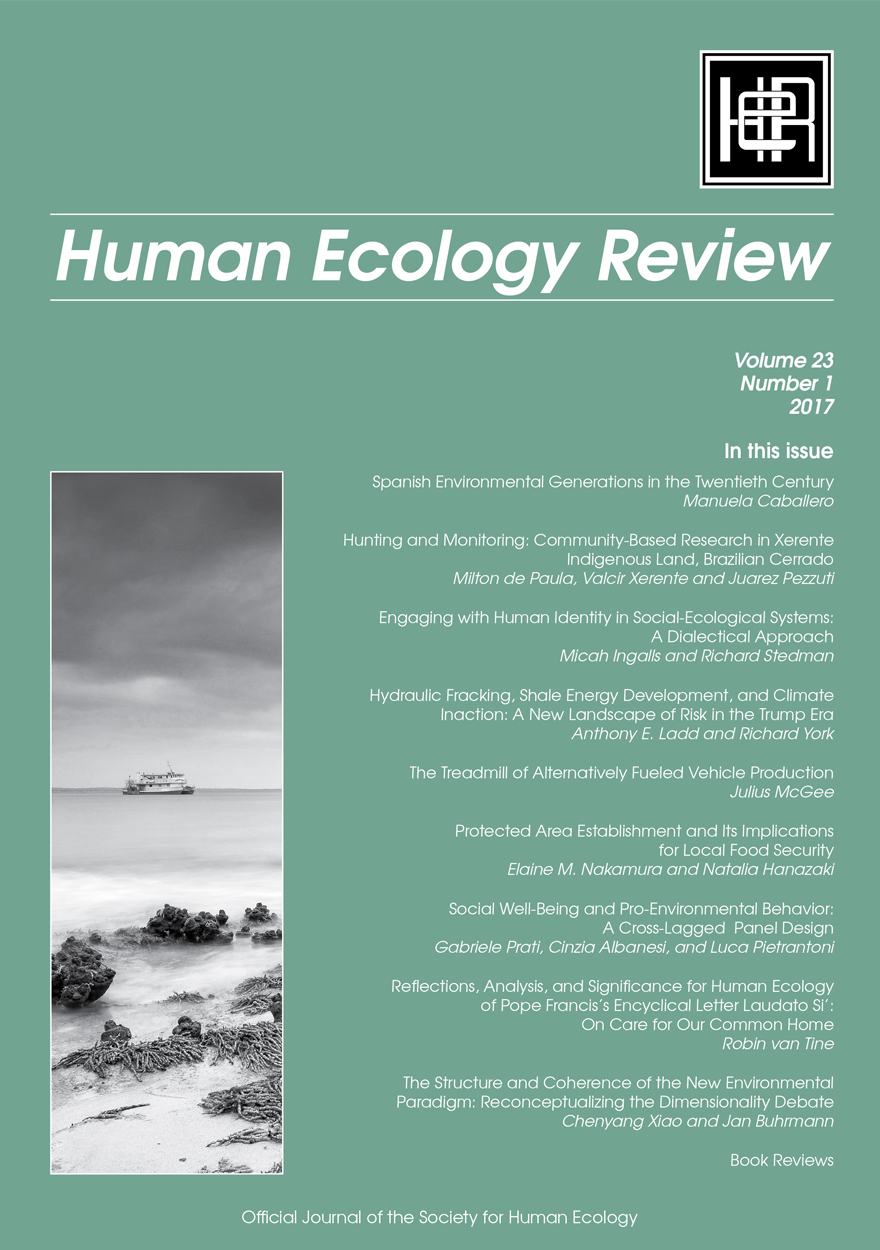
Human Ecology Review: Volume 23, Number 1 »
Publication date: September 2017
Human Ecology Review is a semi-annual journal that publishes peer-reviewed interdisciplinary research on all aspects of human–environment interactions (Research in Human Ecology). The journal also publishes essays, discussion papers, dialogue, and commentary on special topics relevant to human ecology (Human Ecology Forum), book reviews (Contemporary Human Ecology), and letters, announcements, and other items of interest (Human Ecology Bulletin). Human Ecology Review also publishes an occasional paper series in the Philosophy of Human Ecology and Social–Environmental Sustainability.
Download for free
Not available for purchase

The General’s Goose »
Fiji's Tale of Contemporary Misadventure
Authored by: Robbie Robertson
Publication date: August 2017
His admirers said he was a charismatic leader with a dazzling smile, a commoner following an ancient tradition of warrior service on behalf of an indigenous people who feared marginalisation at the hands of ungrateful immigrants. One tourist pleaded with him to stage a coup in her backyard; in private parties around the capital, Suva, infatuated women whispered ‘coup me baby’ in his presence. It was so easy to overlook the enormity of what he had done in planning and implementing Fiji’s first military coup, to be seduced by celebrity, captivated by the excitement of the moment, and plead its inevitability as the final eruption of long-simmering indigenous discontent. A generation would pass before the consequences of the actions of Fiji’s strongman of 1987, Sitiveni Rabuka, would be fully appreciated but, by then, the die had been well and truly cast. The major general did not live happily ever after. No nirvana followed the assertion of indigenous rights. If anything, misadventure became his country’s most enduring contemporary trait. This is Fiji’s very human story.
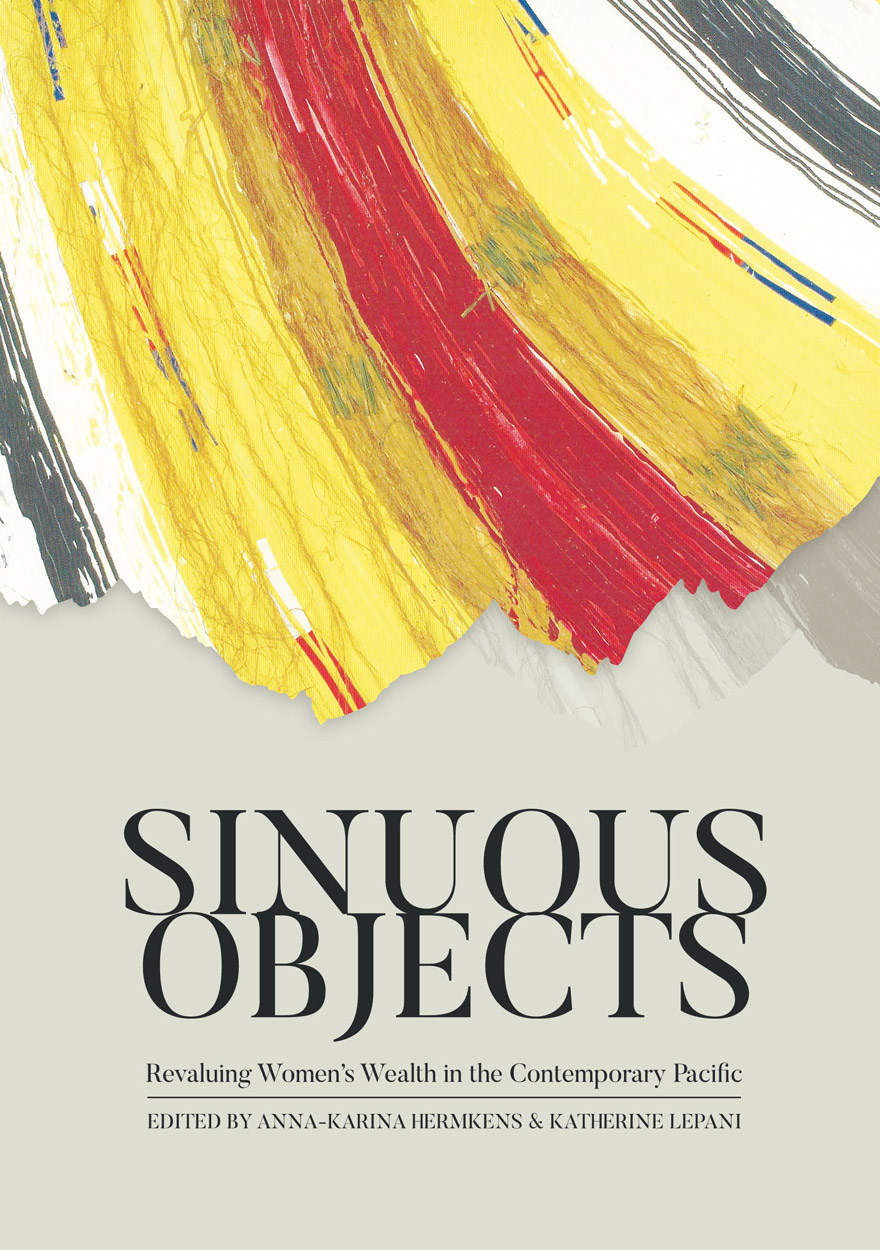
Sinuous Objects »
Revaluing Women’s Wealth in the Contemporary Pacific
Edited by: Anna-Karina Hermkens, Katherine Lepani
Publication date: August 2017
Some 40 years ago, Pacific anthropology was dominated by debates about ‘women’s wealth’. These exchanges were generated by Annette Weiner’s (1976) critical reappraisal of Bronisław Malinowski’s classic work on the Trobriand Islands, and her observations that women’s production of ‘wealth’ (banana leaf bundles and skirts) for elaborate transactions in mortuary rituals occupied a central role in Trobriand matrilineal cosmology and social organisation. This volume brings the debates about women’s wealth back to the fore by critically revisiting and engaging with ideas about gender and materiality, value, relationality and the social life and agency of things. The chapters, interspersed by three poems, evoke the sinuous materiality of the different objects made by women across the Pacific, and the intimate relationship between these objects of value and sensuous, gendered bodies.
In the Epilogue, Professor Margaret Jolly observes how the volume also ‘trace[s] a more abstract sinuosity in the movement of these things through time and place, as they coil through different regimes of value … The eight chapters … trace winding paths across the contemporary Pacific, from the Trobriands in Milne Bay, to Maisin, Wanigela and Korafe in Oro Province, Papua New Guinea, through the islands of Tonga to diasporic Tongan and Cook Islander communities in New Zealand’. This comparative perspective elucidates how women’s wealth is defined, valued and contested in current exchanges, bride-price debates, church settings, development projects and the challenges of living in diaspora. Importantly, this reveals how women themselves preserve the different values and meanings in gift-giving and exchanges, despite processes of commodification that have resulted in the decline or replacement of ‘women’s wealth’.
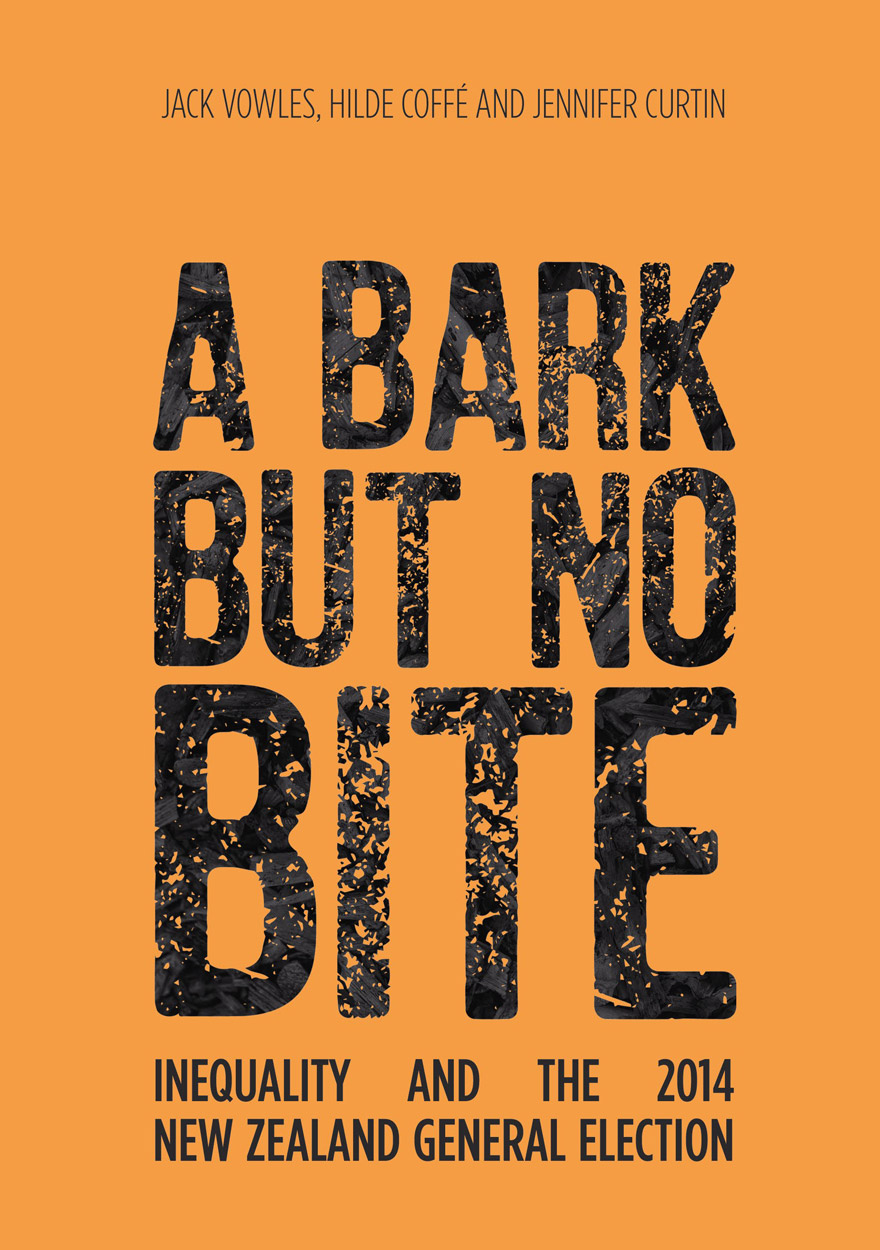
A Bark But No Bite »
Inequality and the 2014 New Zealand General Election
Publication date: August 2017
Based on New Zealand Election Study (NZES) data from a sample of 2,830 eligible voters, A Bark But No Bite explores a puzzle. While there was a lot of talk about inequality before the 2014 general election in New Zealand, and during the campaign, concern about inequality appeared to have no tangible effect on the election outcome. This book shows that, by its attention to the concerns of middle ground voters, the National Government had reduced the potential of policy differences to drive voter choices. Perceptions of competence and effective leadership were National’s strongest suit, crowding out voter concerns over matters of policy. When voters did consider policy, inequality and related concerns were second to the economy. Traditional priorities about health and education, and perceptions of party differences on these matters, had faded into the background.
Meanwhile, voters doubted the opposition Labour Party’s ability to govern effectively in an alternative coalition to that of the National-led government. Labour’s policies were too many. In various ways, they would have chipped away at inequality, but lacked a coherent narrative and presentation. This book confirms that Labour’s proposal to increase the age for receipt of New Zealand superannuation gained Labour no new votes.
Hopes that the ‘missing million’ people who failed to turn out to vote in 2011 would vote in 2014 and give an advantage to the left were unfulfilled. A comprehensive study of the 2014 election, this book provides a detailed account of all these findings, and a host of others.

The Human Voyage: Undergraduate Research in Biological Anthropology: Volume 1, 2017 »
Publication date: August 2017
The Human Voyage: Undergraduate Research in Biological Anthropology is a journal that publishes outstanding student articles in all areas of biological anthropology, including primatology, palaeoanthropology, bioarchaeology and human behavioural ecology.
While the primary goal of this journal is to publish work of the highest quality authored by undergraduate students, it will also educate students in regards to publishing in academia. All submissions will be peer-reviewed and edited by ANU academic staff.
Download for free
Not available for purchase
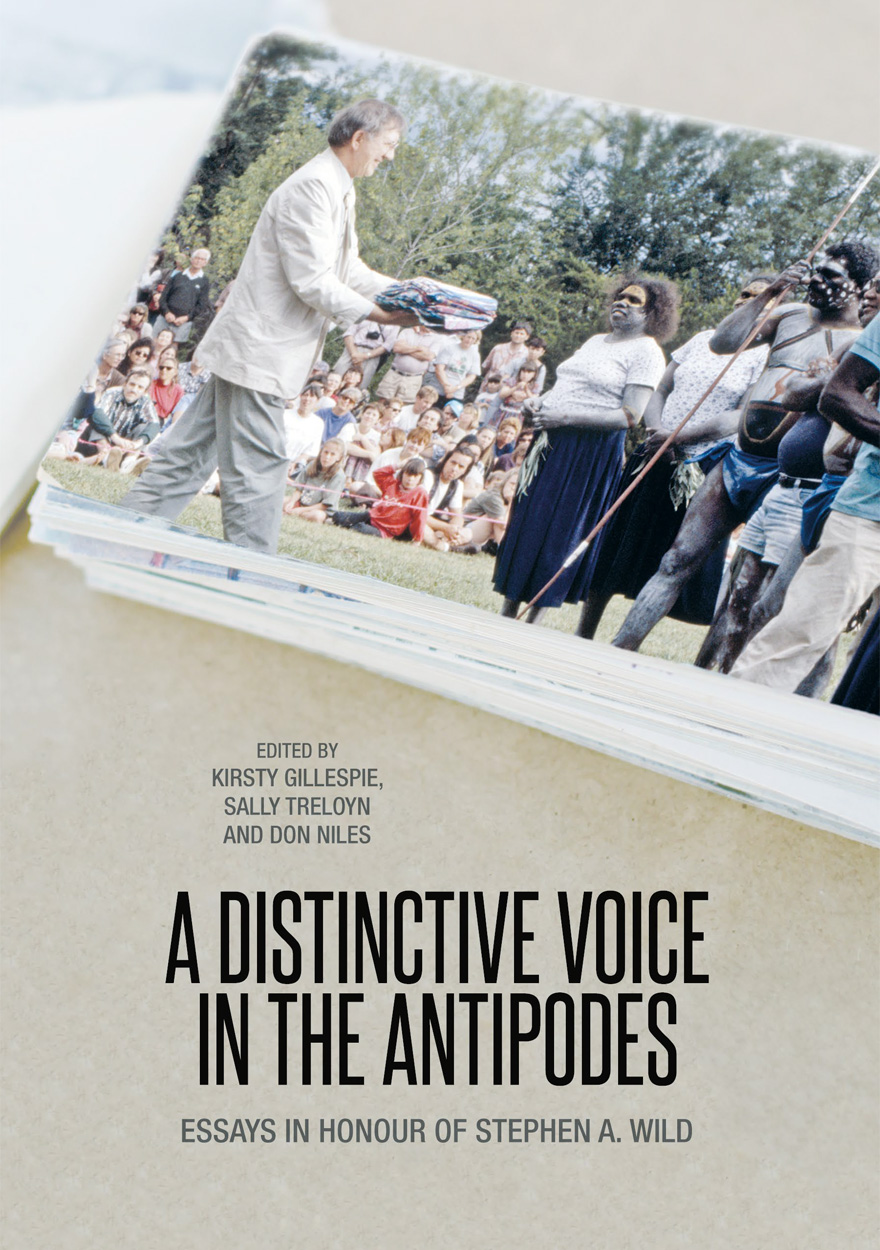
A Distinctive Voice in the Antipodes »
Essays in Honour of Stephen A. Wild
Publication date: July 2017
This volume of essays honours the life and work of Stephen A. Wild, one of Australia’s leading ethnomusicologists. Born in Western Australia, Wild studied at Indiana University in the USA before returning to Australia to pursue a lifelong career with Indigenous Australian music.
As researcher, teacher, and administrator, Wild’s work has impacted generations of scholars around the world, leading him to be described as ‘a great facilitator and a scholar who serves humanity through music’ by Andrée Grau, Professor of the Anthropology of Dance at University of Roehampton, London.
Focusing on the music of Aboriginal Australia and the Pacific Islands, and the concerns of archiving and academia, the essays within are authored by peers, colleagues, and former students of Wild. Most of the authors are members of the Study Group on Music and Dance of Oceania of the International Council for Traditional Music, an organisation that has also played an important role in Wild’s life and development as a scholar of international standing.
Ranging in scope from the musicological to the anthropological—from technical musical analyses to observations of the sociocultural context of music—these essays reflect not only on the varied and cross-disciplinary nature of Wild’s work, but on the many facets of ethnomusicology today.
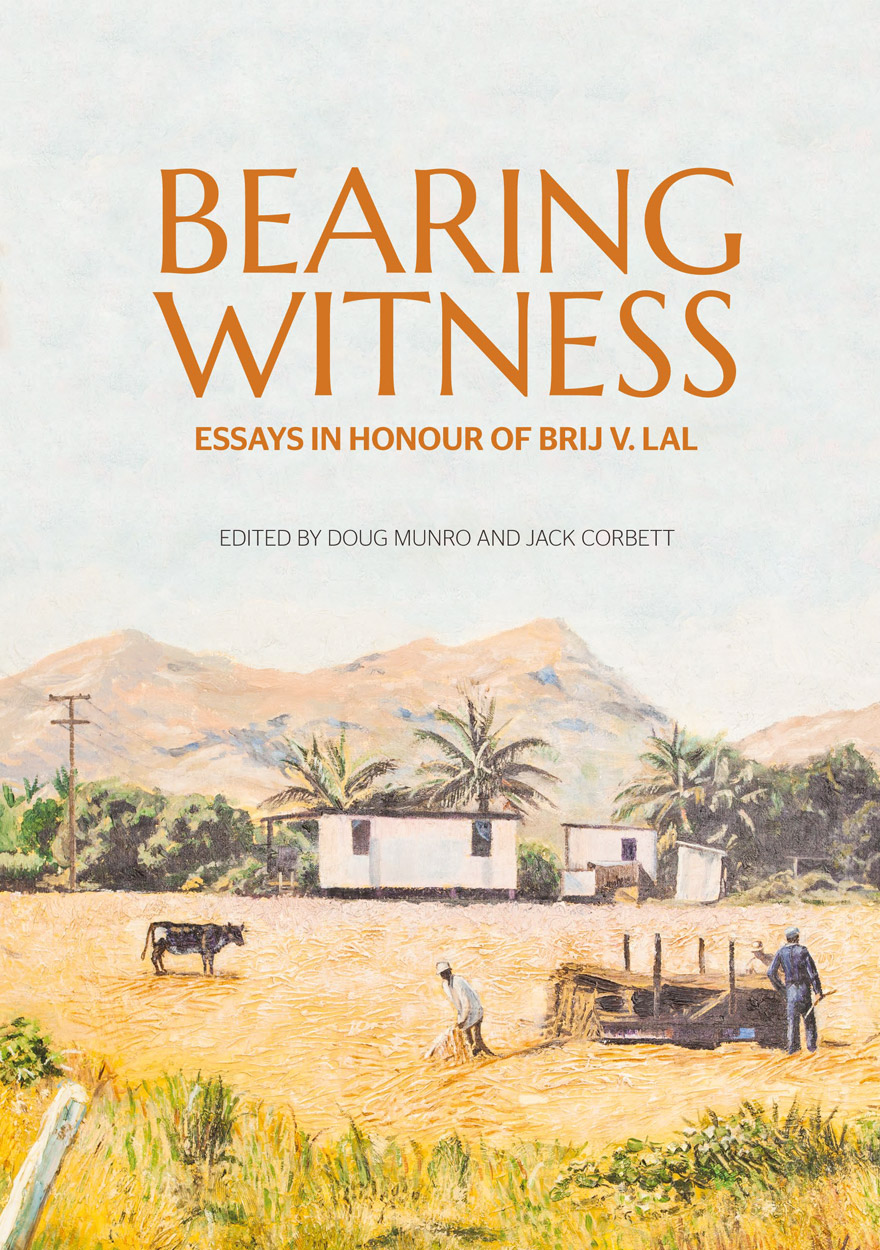
Bearing Witness »
Essays in honour of Brij V. Lal
Edited by: Doug Munro, Jack Corbett
Publication date: July 2017
"Brij V. Lal is a singular scholar. His work has spanned disciplines—from history to politics—and genres—from conventional monograph history, to participant history, political commentary, encyclopaedia, biography and faction. Brij is without doubt the most eminent scholar Fiji has ever produced. He also remains the most significant public intellectual of his country, despite having been banned from entering it in 2009. He is also one of the leading Pacific historians of his generation, and an internationally recognised authority on the Indian diaspora. This Festschrift volume celebrates, reflects upon and extends the life and work of this colourful scholar. The essays, whose contributors are drawn from across the globe, do more than review Brij’s work; they also probe his contribution to both scholarly and political life. This book will therefore serve as an invaluable guide for readers from all walks of life seeking to better situate and understand the impact of Brij’s scholarly activism on Fiji and beyond."
— Clive Moore, University of Queensland
"It is a pleasure to commend this collection of very different essays that celebrate, reflect upon and extend the life and work of a remarkable scholar. Although I have had, at times, a close association with Brij Lal’s life and work, I have learned much from reading this book. It provokes further thought about the course of democracy in Fiji, and the very sorry state and future of Pacific history and the humanities in academia. Here is a timely assertion of the significance and major contribution that courageous scholars such as Brij have made to the study and public awareness of these areas of concern."
— Jacqueline Leckie, University of Otago

Ten Thousand Years of Cultivation at Kuk Swamp in the Highlands of Papua New Guinea »
Publication date: July 2017
Kuk is a settlement at c. 1600 m altitude in the upper Wahgi Valley of the Western Highlands Province of Papua New Guinea, near Mount Hagen, the provincial capital. The site forms part of the highland spine that runs for more than 2500 km from the western head of the island of New Guinea to the end of its eastern tail. Until the early 1930s, when the region was first explored by European outsiders, it was thought to be a single, uninhabited mountain chain. Instead, it was found to be a complex area of valleys and basins inhabited by large populations of people and pigs, supported by the intensive cultivation of the tropical American sweet potato on the slopes above swampy valley bottoms.
With the end of World War II, the area, with others, became a focus for the development of coffee and tea plantations, of which the establishment of Kuk Research Station was a result. Large-scale drainage of the swamps produced abundant evidence in the form of stone axes and preserved wooden digging sticks and spades for their past use in cultivation. Investigations in 1966 at a tea plantation in the upper Wahgi Valley by a small team from The Australian National University yielded a date of over 2000 years ago for a wooden stick collected from the bottom of a prehistoric ditch.
The establishment of Kuk Research Station a few kilometres away shortly afterwards provided an ideal opportunity for a research project.

China's New Sources of Economic Growth: Vol. 2 »
Human Capital, Innovation and Technological Change
Edited by: Ligang Song, Ross Garnaut, Cai Fang, Lauren Johnston
Publication date: July 2017
China’s efforts in searching for new sources of growth are increasingly pressing given the persistence of the growth slowdown in recent years. This year’s book elucidates key present macroeconomic challenges facing China’s economy in 2017, and the impacts and readiness of human capital, innovation and technological change in affecting the development of China’s economy. The book explores the development of human capital as the foundations of China’s push into more advanced growth frontiers. It also explores the progress of productivity improvement in becoming the primary mechanism by which China can sustain economic growth, and explains the importance of China’s human capital investments to success on this front. The book demonstrates that technical change is a major contributor to productivity growth; and that invention and innovation are increasingly driving technical change but so far lumpily across regions, sectors and invention motivations. Included are chapters providing an update on reform and macroeconomic development, educational inequality, the role of intangibles in determining China’s economic growth, and China’s progress in transitioning towards being an innovative country. The book also covers the regional dimension of innovation and technological progress by sector: in agricultural productivity, renewable energy and financial markets. Chapters on trade, investment, regional cooperation and foreign aid explore further the mechanisms through which technological change and innovative activities are emerging locally and internationally.



